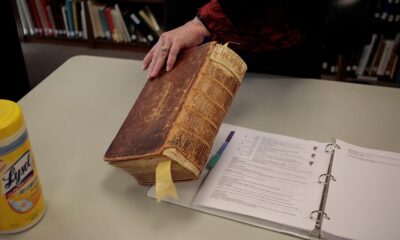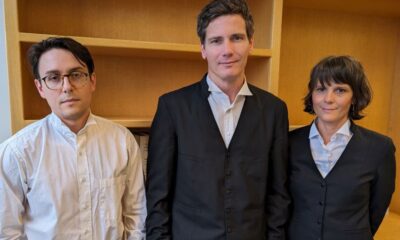Science
Renowned Biologist David Baltimore Passes Away at 87

David Baltimore, the esteemed Nobel Prize-winning molecular biologist and former president of the California Institute of Technology (Caltech), has died at the age of 87 due to complications from cancer. His groundbreaking work in the field of virology, particularly in understanding the mechanisms of genetic information, has left a lasting impact on biology and medicine.
Born in New York City in 1938, Baltimore grew up in a family that valued education. His father worked in the garment industry, while his mother became a psychologist. David’s early interest in science was sparked during a summer at the Jackson Laboratory in Maine, where he learned about mouse genetics. He graduated from Swarthmore College and earned his PhD in biology from Rockefeller University in 1964, focusing on viruses in animal cells.
1975 marked a pivotal year in Baltimore’s career when he was awarded the Nobel Prize in Physiology alongside Howard Temin and Renato Dulbecco. Their collective discoveries reshaped the understanding of how tumor viruses interact with cellular genetic material. This work fundamentally altered the previously accepted notion that genetic information flowed in only one direction—from DNA to RNA to protein synthesis. Baltimore’s revelation of reverse transcriptase, an enzyme that enables RNA viruses to convert their genetic material into DNA, opened new avenues for gene therapy and research into genetic diseases.
Legacy and Controversies
Despite his scientific accolades, Baltimore’s career was not without controversy. In the late 1980s, he became embroiled in a high-profile investigation into alleged scientific misconduct related to a co-authored research paper. The investigation, known as “the Baltimore affair,” centered on a study conducted by his colleague at MIT, Thereza Imanishi-Kari, concerning immune system gene rearrangement. A postdoctoral researcher accused Imanishi-Kari of fabricating data, prompting an extensive inquiry by the National Institutes of Health (NIH) that even involved forensic analysis by the U.S. Secret Service.
While Baltimore was not accused of any wrongdoing himself, his defense of Imanishi-Kari drew significant scrutiny. The NIH ultimately found her guilty of multiple counts of research misconduct, leading to her being barred from receiving federal funding for ten years. Baltimore’s role in the investigation caused him considerable distress and led to his resignation as president of Rockefeller University in 1991.
In the aftermath, he returned to MIT and later took on the presidency at Caltech in 1993. Baltimore continued to make significant contributions to science, focusing on research into viral vectors and the mammalian immune system. He remained active in his field until he stepped down from the presidency in 2006, yet continued his research and advocacy for ethical scientific practices.
Personal Reflections and Impact
Baltimore’s influence extended beyond his scientific achievements. Colleagues and friends remember him not only for his intellect but also for his diverse interests, which included music, art, and a passion for travel. Thomas Palfrey, a professor emeritus at Caltech, noted Baltimore’s multifaceted life, stating, “He led a very multifaceted life, one of these people who put his foot on the accelerator and never let up.”
He is survived by his wife of 57 years, Alice Huang, a fellow biologist, along with a daughter and granddaughter. Current Caltech President Thomas F. Rosenbaum praised Baltimore’s extensive contributions, stating, “David Baltimore’s contributions as a virologist… have transformed biology and medicine.”
As the scientific community mourns his passing, David Baltimore’s legacy as a pioneering scientist, a dedicated mentor, and a steadfast advocate for ethical research practices will undoubtedly endure.
-

 World3 months ago
World3 months agoScientists Unearth Ancient Antarctic Ice to Unlock Climate Secrets
-

 Entertainment4 months ago
Entertainment4 months agoTrump and McCormick to Announce $70 Billion Energy Investments
-

 Lifestyle3 months ago
Lifestyle3 months agoTransLink Launches Food Truck Program to Boost Revenue in Vancouver
-

 Science4 months ago
Science4 months agoFour Astronauts Return to Earth After International Space Station Mission
-

 Technology2 months ago
Technology2 months agoApple Notes Enhances Functionality with Markdown Support in macOS 26
-

 Top Stories2 weeks ago
Top Stories2 weeks agoUrgent Update: Fatal Crash on Highway 99 Claims Life of Pitt Meadows Man
-

 Sports3 months ago
Sports3 months agoSearch Underway for Missing Hunter Amid Hokkaido Bear Emergency
-

 Politics3 months ago
Politics3 months agoUkrainian Tennis Star Elina Svitolina Faces Death Threats Online
-

 Technology3 months ago
Technology3 months agoFrosthaven Launches Early Access on July 31, 2025
-

 Politics3 months ago
Politics3 months agoCarney Engages First Nations Leaders at Development Law Summit
-

 Entertainment3 months ago
Entertainment3 months agoCalgary Theatre Troupe Revives Magic at Winnipeg Fringe Festival
-

 Politics2 weeks ago
Politics2 weeks agoShutdown Reflects Democratic Struggles Amid Economic Concerns





















